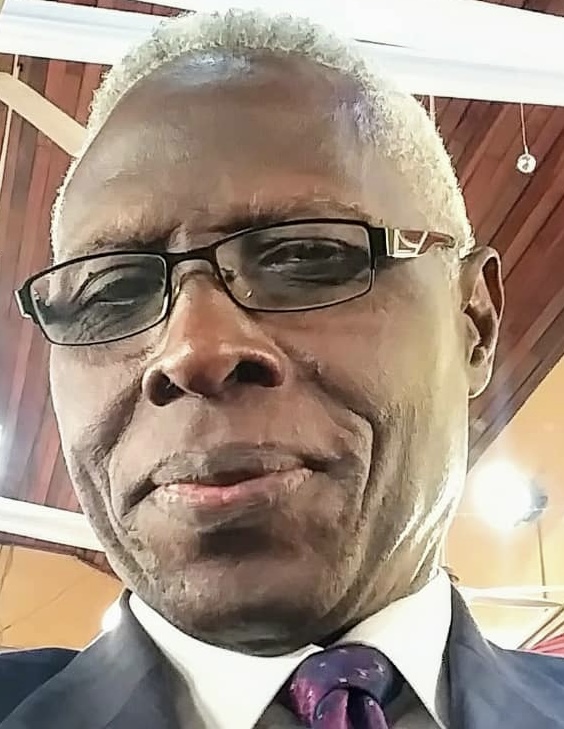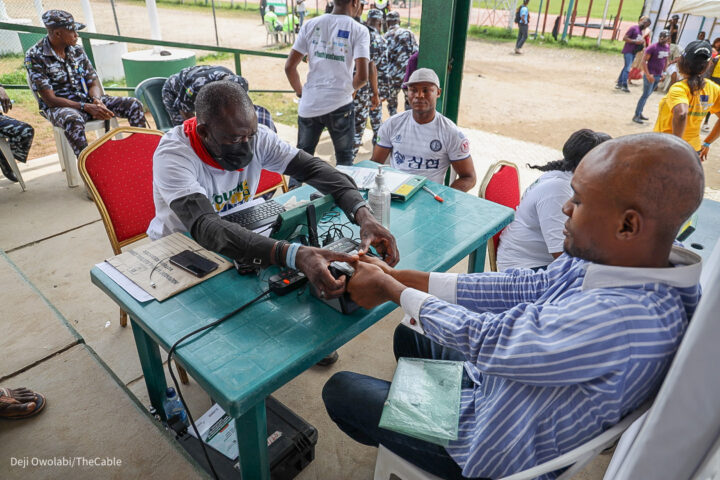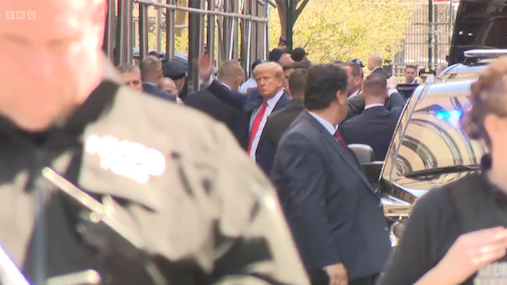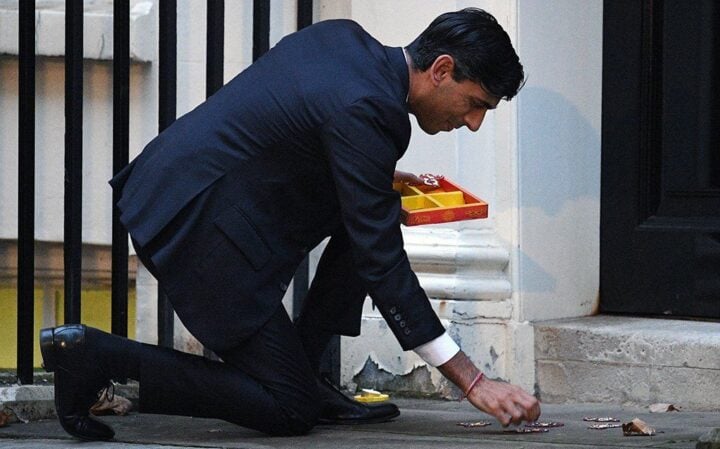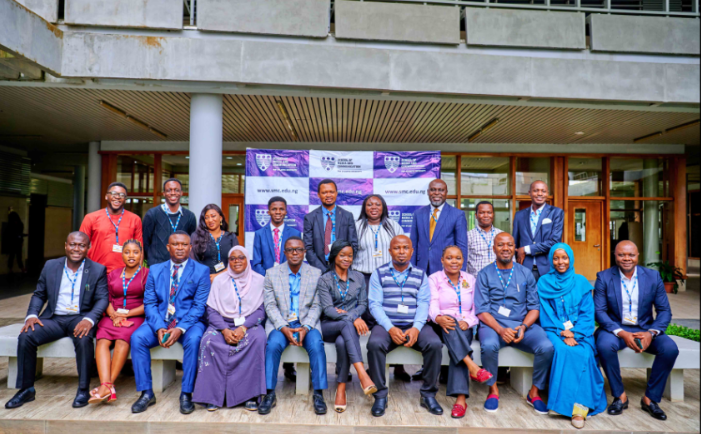Somehow, the geometrical construct known as the Triangle plays a significant role to instruct human conduct. In its tripartite or trichotomous forms, it’s been known to shapen human actions and reactions remarkably, albeit subliminally.
Think of the composite three states of being, mystery of the pyramids, the efficiency of a tripodal stove, aka “aro meta”, and the intricacies of a love triangle and you’d gain an orbed understanding of this phenomenon.
Yet, it is as likely as not that the peculiarities of a three-way love tangle, for instance, could equate the complexities of a novel triangular tussle and political acrimony deriving, principally, from the outcome of the February 25, 2023 Presidential Election in Nigeria.
With a winning edge blighted by unprecedented competitiveness that flipped political strongholds, the advent of an overperforming third force and a glitchy transmission of results, the stage was set for a familiar but new post-election showdown.
Advertisement
Unlike the familiar face- off between two major contenders on our political arena of yesteryears, there’s a new triangular spat awaiting the deconstruction of the courts among the three top political parties viz: the ruling All Progressives Congress (APC), Peoples Democratic Party (PDP) and Labour Party (LP).
At the inception of the Second Republic in 1979, the political fray in the court was between the National Party of Nigeria (NPN) and the Unity Party of Nigeria (UPN).
President Shehu Shagari , NPN, became the legitimate winner to the inevitable concession by Chief Obafemi Awolowo, UPN, in a judicial decision that fixed the two thirds of 19 states at 12 two thirds.
Advertisement
Indeed, the General Ibrahim Babagida’s military government attempted to correct a perceived deficiency of our multi- party heritage by legislating the Social Democratic Party ,(SDP) and the National Republican Party, (NRC) to run in 1993. The outcome of that experiment is a now a narrative of legend stuff.
The point is that the final onslaught of presidential elections from the President Olusegun Obasanjo versus Chief Olu Falae era in 1999 through President Umaru Yar Adua and General Muhammadu Buhari tug in 2007 to President Buhari against Alhaji Abubakar Atiku slug in 2019- it’s been a construct of two intersecting tussle.
Fast forward to 2023AD however, the results of the Presidential Elections announced by Chairman of Independent National Electoral Commission (INEC) Prof Mahmood Yakubu, showed that the All Progressives Congress (APC) candidate , Asiwaju Bola Ahmed Tinubu scored a total of 8,794,726 votes to claim the vertex of this triangle.
His victory compelled his two closest rivals and candidates of the Peoples Democratic Party, (PDP) Atiku Abubakar and Peter Obi of the Labour Party, (LP) who polled 6,984, 520 and 6,101,533 votes, respectively -to occupy the bases.
Advertisement
Interestingly, a tripartite rivalry popped up with each of the relevant parties winning 12 states and New Nigeria Progressives Party (NNPP) swinging Kano State to complete a 36 plus One(Abuja) state structure.
By sheer chivalry or indoctrination , the last Presidential Elections turned out to be a triangular post- election contestation among the top three parties.
As earlier inferred , it would have been the two political behemoths: APC and PDP slugging it out at the polls and, ultimately, in the courts.
But, the LP, thought to be a structure-less, paper tiger introduced an interesting twist to the scenario.
Advertisement
Recall that as election approached the ruling APC carried the baggage of insecurity, petroleum queues and cash crunch policy, while PDP was racked by the decamping of Peter Obi its erstwhile vice presidential candidate and Senator Rabiu Kwankwaso to the LP and NNPP respectively. Also, the stiff opposition of the G5 governors to chairmanship of Dr Iyorchia Ayu was an obstacle to victory.
The LP, on the other hand, did not seem to have as much encumberances such as APC’s Muslim/Muslim ticket controversy and PDP’s lopsided leadership problem.
Advertisement
Drawing an ironical political goodwill from the ill-will of Nigerian electorates against President Muhammadu Buhari’s lacklustre response to socio-economic and security issues, the LP offered a refreshing alternative.
The Labour Party and its relatively young standard bearer, Peter Obi, a former governor of Anambra State seemed to aggregate the hopes and aspirations for a hardly likely seismic change of direction.
Advertisement
Although many other parties paraded other young ,brilliant and untainted presidential candidates, soft-spoken Peter Obi captured the imagination of those craving for an equitable power sharing formula in Nigeria.
Subscribers to this ideal, across ethnic divide, argued that the South Eastern geopolitical zone has been short -changed and were resolute about pushing an Obi agenda to the hilt if only to balance the equation.
Advertisement
Expectedly, the ruling APC albatrossed by its outspoken, bare- knuckling presidential candidate, Bola Tinubu and the opposition party, PDP, ambushed by its flagbearer, Atiku Abubakar would brook none of the effrontery and overbearing confidence of the social-media-savvy, LP.
Curiously, this atmosphere of reciprocal suspicion which hung over the polity now beclouds a post election firmament.
The situation today is such that even as a judicial challenge to the results has been activated through petitions filed at the Election Tribunal , the dins of undemocratic propositions have reached a crescendo.
Apart from LP/Obidients backed protests typified by a ludicrous appeal for military intervention and impatience with judicial process, outright acts that skirt the rinks of treason have seeped into the triangle of conflict through calls for massive anti-May 29 handover protest and the institution of an unconstitutional Interim National Government (ING).
In the wake of these glittering incongruities, the Department of State Services (DSS) had to issue an alert that some people were planning to disrupt the handover process by pushing for an interim government. But for the fact that the DSS is an instrument of governance which treads cautiously on politically sensitive issues, their alarm would have been dismissed as utterly facetious.
Evidence for these untoward undecurrents however became rife in the desperate prime time Television outburst of the Vice Presidential candidate of the LP, Datti Baba -Ahmed. who threatened “fire and brimstone” if the president elect, Bola Tinubu was sworn- in on May 29 ,2023- the constructional handover date.
In his reaction to this inflammatory statement , the Nobel Laureate, Prof Wole Soyinka denounced the “menacing utterances” of Datti Ahmed as “incipient fascism”.
Expressing disappointment with the intolerance quotient of “Obidients”, Prof Soyinka, also revealed that he was able to send a message to Peter Obi that “if he lost the election, it was his followers that lost it for him.”
The questions that arise from these developments would bother on why the average politicians do not believe that their subscription to justice, democratic ideals and the rule of law should not be selective. They seem to forget in a hurry that politics is not a do-or-die affair and there’s a level of decorum below which a democrat must not descend: win or lose.
What depth of disgust or frustration would make the LP, which placed third in the Presidential election petition the tribunal to order a rerun in which the winning APC and its candidates should be excluded.
Surely, it is only an overweening ambition that could make LP with one-quarter of votes cast in only 15 states; grossly short of the 25 percent constitutional requirement in two-thirds of the states of the federation lay claim to perceptual preeminence over the the runner up – PDP – which won 25 percent in 21 states.
It may smack of an attempt to stir the emotions of its young and youthful supporters inordinately to submit a judicial prayer that the 29 states secured by the APC from the Southwest, South-South, North West and North Eastern zones by the president elect were products of massive rigging worthy on being trashed.
But there’s also a figurative or poetic beauty in all these protestations. It can be gleaned through a cursory analysis of the petitions filed at the tribunal which threw up prayers that would receive judicial interpretations and eventually clear speculations on critical elements of the state of our union such as the classification of Abuja and eligibility of candidates occupying political office prior to new party nominations.
With all these poignant intersections between the law and politics, it would be interesting to see how the courts would deepen our democracy through its judgements.
As things stand, perhaps, out of maturity, introspection or genuine patriotism, the PDP which occupies the right base of the triangle of conflict is maintaining a more decorous approach to issues.
It is against the backdrop of the allegations of treason and incitement to violence that the Labour Party could be treading a mine-laden field through the recklessness and indiscretion of heating up the polity.
Rather than threaten that the swearing-in of the President elect on May 29 would be the end of democracy in Nigeria” the LP should rededicate itself to the high ideals of democracy.
On its illegal insistence that there should be no swearing- in on May 29, the leaders and supporters of the party should repose confidence in the ability of the courts to dispense justice.
Afterall, the wheel of justice grinds slowly but surely.
Evidence abound of governors who had been sworn in but had to relinquish their position through court judgements.
In the same manner, there’s nothing sacrosanct about proceeding with the petitions against the victory of the APC and. the president-elect beyond May 29 2023.
Whatever happens, it is save to project that Nigerian democracy would survive the May 29 Handover date.
It is incumbent on all parties to the fray to ensure that this Triangle of Umbrage does not become a “Triangle of Wreckage” of our longest surviving democratic experience.
Jenrola, a veteran journalist and communication consultant writes from Lagos.
Views expressed by contributors are strictly personal and not of TheCable.
Add a comment
